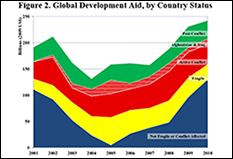UMD Researchers Receive $2.5m Grant to Study Link Between Aid and Conflict
UMD Researchers Receive $2.5m Grant to Study Link Between Aid and Conflict

Over the past 30 years, conflict between countries has become relatively rare; however intrastate conflict – civil wars, territorial disputes, and insurgencies - remains a persistent global phenomenon. The United States has distributed more than $200 billion in development assistance between 2001-2010, with the vast majority disbursed to conflict-affected states. New research at the University of Maryland seeks to leverage major advances in information, technology and methodology to better understand the relationship between aid and conflict. The project 'Aiding Resilience? The Impact of Foreign Assistance on the Dynamics of Intrastate Armed Conflict’ has just received a $2.5 million grant from the Minerva Initiative of the U.S. Department of Defense to study the association between development aid and the likelihood, escalation, severity, spread, duration, and recurrence of violence, spanning the phases before, during, and after armed conflict.
The Minerva Initiative is a program to support university-based social science research that was launched by the Secretary of Defense in 2008. The goal of the Initiative is to bring together universities, research organizations, and individual scholars to improve the DoD's basic understanding of the social, cultural, behavioral, and political forces that shape various regions of the world. Because two of the initiative’s key objectives are to develop foundational knowledge about sources of present and future conflict, and to understand the economic contributors to stability, the ‘Aiding Resilience?’ study is of particular interest.
“The overarching goal of our project is to establish when and why aid contributes to reduced violence, and when and why it doesn’t,” says Professor Paul Huth, Director of the UMD Center for International Development and Conflict Management (CIDCM), Professor of Government & Politics and principal investigator for the study. “Besides the relevance that the findings will have to aid and conflict-related policy decisions, the data resources created through our study will provide information essential to the successful planning and deployment of assistance around the globe.”
Typically, researchers have approached the topic at the country level, studying aid in general terms and narrowly examining specific aspects of conflict. By contrast, Dr. Huth and the other members of the project team are focused on disaggregating existing data and collecting new information to develop a far more comprehensive and holistic view of aid’s impact on conflict. “We are combining expansive aid data with diverse sets of other information, including geospatial data, demographics, history, and so on.”
To support this undertaking, Dr. Huth is supported by a number of researchers at UMD and beyond. “We have intentionally built an interdisciplinary, international team,” says Dr. David Backer, Assistant
Director of CIDCM and co-principal investigator on the Minerva grant. “Collaborators in multiple countries will be collecting and analyzing data and building tools to help visualize our findings.”
Partners on the project include the College of William & Mary, the Institute of Development Studies (UK), the Graduate Institute of International and Development Studies (Switzerland), and Development Gateway – each contributing vital, distinctive expertise to the project. The work based at UMD will be concentrated in CIDCM and the Center for International Security Studies at Maryland (CISSM). Dr. Kevin Jones, a Research Associate at CISSM and also a co-principal investigator on the Minerva grant, highlights the appeal of linking units to work together. “This project capitalizes on two significant research clusters within the university that have world-class expertise on analyzing the underlying dynamics of localized conflict. The combination of the UMD resources with the external partners provides a unique opportunity to move the data-collection and analysis process forward much farther than our respective individual efforts might.”
“These studies are of broad value to conflict and aid researchers, who are limited by the information that is currently available. Beyond its contribution to policy, science and public resources, the grant will support student learning at all levels,” says Dr. Backer. “More than 100 undergraduates and graduate students will contribute to this study, from data collection to analysis, to the creation of new tools.”
Related Articles:UMD Researchers Receive Grants under New Federal BRAIN Initiative
UMD, NIST Announce Joint Center for Quantum Information and Computer Science
Emerging Disease Could Wipe Out American, European Salamanders
UMD and UW Lead New NIH-funded Mentor Training Program to Advance Diversity of Biomedical Workforce
UMD Professor Receives $1.9M to Study Cell “Glue” Important in Disease
UMD Alumnus and CEO, Brendan Iribe, purchases liscensing rights to UMD-founded Company
UMD and NIH Researchers Receive $1.7M BRAIN Grant to Investigate How Crowds of Neurons Process Sensory Information
Major Milestone in the Search for Water on Distant Planets
Li and Hu Awarded NSF Grant to Study Challenges in Creating Materials that are Both Stronger and Tougher
Tigers, Pandas & People: A Recipe for Conservation Insights
November 13, 2014
Prev Next
Connect
Did You Know

UMD is the only major public research university inside the Washington, DC beltway!!
